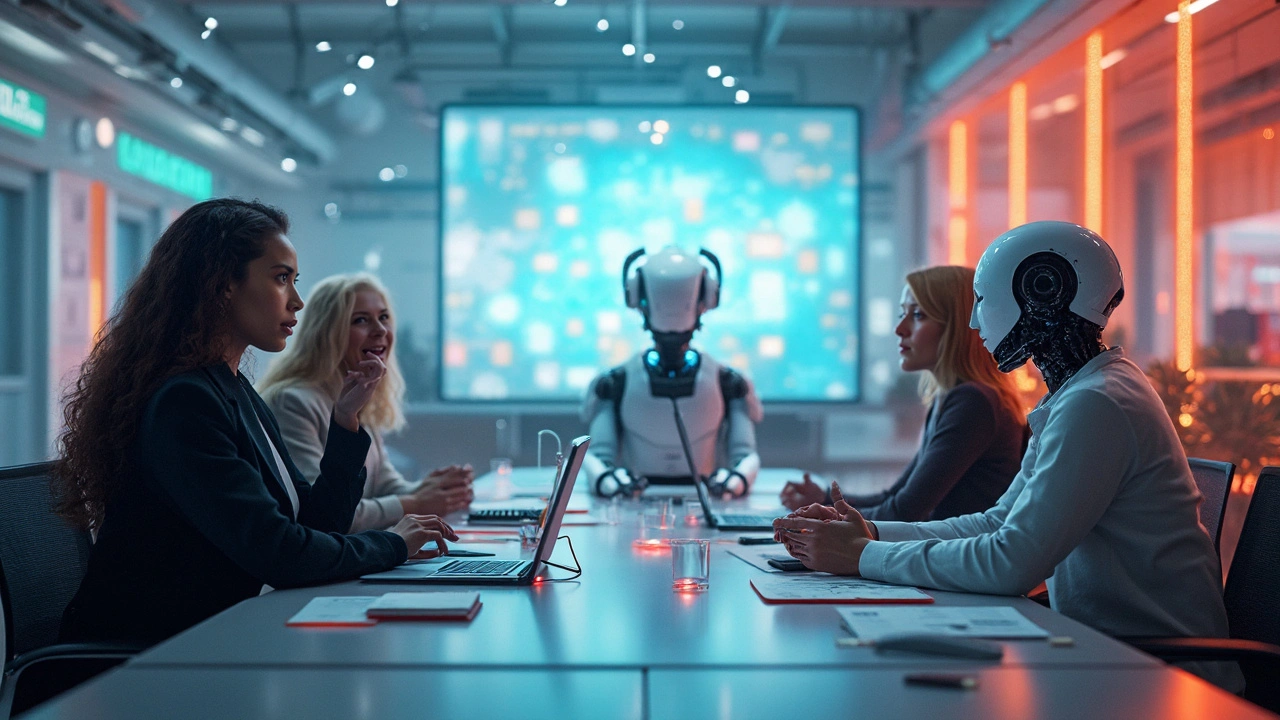Artificial General Intelligence, or AGI for short, is like the holy grail of artificial intelligence. Imagine a machine that thinks like a human, not just in one specific task but across any task you throw at it. Sounds like science fiction, right? Well, that's what researchers are aiming for.
Right now, most of the AI we talk about is pretty specialized. Think of your digital assistant who can help schedule meetings or the algorithms recommending what movies to watch based on your past choices. They're amazing at what they do but pop them into a different environment, and they wouldn't know where to start.
AGI is different. It's like building a brain, one that can learn and adapt without needing a manual every time it encounters a new situation. If we ever manage to crack this nut, the implications could be groundbreaking. Industries? They'll change. Jobs? They'll evolve. Society as a whole might need to rethink a few things. The journey to AGI is full of both promise and pitfalls, making it a topic buzzing with excitement and debate.
- Understanding AGI vs Current AI
- The Technical Challenges Ahead
- Potential Societal Impacts of AGI
- Ethical Considerations
- The Future of AI Research
Understanding AGI vs Current AI
So, what's the big difference between artificial general intelligence and the AI we see today? Well, today's AI is a bit like a really good student—excellent at specific subjects but not quite adaptable to others without some help.
Current AI, also known as narrow AI, excels in performing tasks like image recognition, playing games, or analyzing data. It's all about precision in predefined areas. For example, AI can recognize your face in photos or recommend your next online purchase based on your browsing habits. But switch its tasks, and it'll struggle.
"Today's AI systems often require significant human oversight," says Andrew Ng, a prominent AI researcher. "In contrast, AGI would be capable of performing tasks autonomously across various fields without explicit instructions."
On the other hand, AGI is like a generalist, ready to tackle whatever challenge comes its way because it can learn and adapt like a human brain. This ability would let AGI handle anything from complex problem-solving to learning new languages on the fly. Still in the realm of research, achieving AGI would indeed be a game changer.
The Learning Curve
Narrow AI relies heavily on data and algorithms tailored for specific tasks. Imagine training a dog to sit; you reward it for that particular action. That's similar to how narrow AI functions today. AGI, however, would be more akin to a human who can learn new tasks without needing explicit training for each. It's about understanding and adapting.
AGI's potential to learn and think like humans also poses unique technical challenges, such as developing machines capable of genuine reasoning, understanding context, and making judgments based on limited information. Yet, it's exactly these capabilities that researchers are keen to bring to life.
Potential and Limitations
The potential of AGI is staggering. Machines could cooperate with humans in creative pursuits, make complex decisions, and even venture into unknown scientific territories. The ultimate goal is to create a system that can think and act like humans but without our emotional and physical limitations.
Despite AGI's promise, we're still a long way from seeing it become reality. Researchers worldwide are working on this, trying to overcome hurdles like computational power, ethical considerations, and ensuring that these intelligent machines think and operate safely.
The Technical Challenges Ahead
Developing Artificial General Intelligence isn't like upgrading your phone's software. It's a gigantic leap. We're talking about creating machines that can think, understand, and act like a human, which is not just about throwing more data and algorithms at the problem.
One big hurdle is the lack of understanding of our own brains. We know quite a bit about how brains work, but not enough to replicate everything in silicon. Reproducing consciousness or intuition in a machine starts with understanding it in ourselves, and we're not quite there yet.
Scalability and Processing Power
To even get close to AGI, we're going to need massive computational power. We're talking computing setups that go far beyond today's supercomputers. This is because an AGI needs to process a lot of information very quickly, and current hardware just isn't up to snuff for that kind of workload.
"To create AGI, we need a computer that's both fast and efficient. The problem is, AI demands a lot of energy and we need sustainable solutions," says Peter Voss, a pioneer in AI technology.
Learning and Adaptability
We’ve got to figure out how machines can learn and adapt to the myriad of unpredictabilities life throws at us daily. Current AI can learn from data, sure, but genuine understanding requires machines to draw conclusions and learn from fewer examples, a task humans perform with ease.
- Current machine learning models require huge datasets to understand simple concepts, while humans learn from very few examples.
- Developing unsupervised and transfer learning techniques resembles our own learning but needs further breakthroughs.
This demands innovations in algorithms that allow less structured and more real-world problem-solving approaches—going beyond predefined pathways.
Safety and Ethics
We've got to ask the hard questions: How do we ensure that an AGI aligns with human values? This isn’t just programming a 'good behavior' routine; AGI could develop unexpected strategies. So, maintaining control without stifling intelligence is crucial.
Skeptics worry about machines becoming too autonomous, making decisions that could harm us. Building mechanisms to prevent rogue behavior is complex and requires international cooperation.
While the dream of AGI sparks visions of a sci-fi future, the truth is, we need to tackle these technical challenges head-on. As we inch closer to achieving AGI, each hurdle gives us fresh questions and a deeper understanding of what it means to be both human and machine.

Potential Societal Impacts of AGI
When we're talking about artificial general intelligence, we're diving into something that could seriously shake up how we live and work. If we manage to crack AGI, it's not just going to be about having smarter gadgets. It's a game changer for pretty much everything.
Workforce Transformation
Let's start with jobs. There's no denying that AGI could take over tasks across the board, from routine manual jobs to creative problem solving. Some folks are worried about job loss, and with good reason. But if history tells us anything, it's that new tech often creates new gigs, even as it makes some old ones redundant.
- Routine tasks may shrink, but creative and strategic work could boom.
- Retraining and lifelong learning might become the new norm.
Economic Shifts
The economic landscape could get a makeover too. With machines capable of learning and decision-making, industries might see an efficiency boost. Think about faster innovations and more personalized services.
But on the flip side, there could be a wealth gap widening if these advances aren't accessible to everyone. Decisions about who owns and controls AGI tech will matter a lot.
Social and Ethical Dimensions
Then there's the social angle. If machines are running the show, what does that mean for human interaction and relationships? What ethical guidelines do we need? Making sure AGI follows a moral compass is key.
- Privacy and data security will be huge concerns.
- We need strong regulations to keep things in check.
And those Hollywood movies about robots taking over? Not just sci-fi prattle. Some experts genuinely debate the risks of AGI surpassing human control.
Conclusion
The possible impacts of AGI aren't all doom and gloom. They could lead to breakthroughs in health, education, and beyond. Yet, they demand thoughtful discussion and planning right now. A balance between innovation and responsibility is crucial as we step into an AGI-filled future.
Ethical Considerations
Diving into the realm of Artificial General Intelligence opens up a Pandora’s Box of ethical dilemmas. These aren't just far-off possibilities; they're valid concerns we need to address to ensure these super-smart machines do more good than harm. So, what are we looking at exactly?
Job Displacement and Economic Impact
Pretty much everyone agrees that AGI might take over tasks currently done by humans. That's both thrilling and terrifying. On one hand, it could mean freedom from tedious chores, but on the flip side, it could lead to job losses on a scale we've never seen before.
Consider industries relying heavily on human expertise. For instance, sectors like transport, manufacturing, and even some service-oriented fields might undergo a transformation. While tech enthusiasts argue that new jobs will emerge, the transition phase could be rocky for many.
Bias and Fairness
Ever heard of AI getting things wrong because it's only as unbiased as the data it's trained on? That's a huge deal. If AGI is built on flawed data, it could make biased decisions faster and across more domains than ever, causing real-world harm. The stakes are higher with AGI, where those biases could influence critical areas like justice and healthcare.
Autonomy and Decision Making
AGI systems potentially making independent decisions raises a ton of questions. How do we make sure they align with human values? And more importantly, whose values should these be? There’s a risk of AGI making choices that humans might not agree with, and that’s a slippery slope.
Safety and Security
Ensuring AGI behaves safely is crucial. Imagine a super-intelligent machine with access to sensitive systems making mistakes or being hijacked. Cybersecurity will have to up its game massively to mitigate potential threats from rogue AGI.
Transparency and Accountability
With AGI, transparency is key. But understanding how a machine arrived at a decision can be as opaque as trying to figure out what’s going on in someone else’s brain. If something goes wrong, who do we hold accountable? These questions don't have easy answers but are crucial to figuring out as we march towards the future of AI research.
Regulation and oversight are going to be a big part of the conversation. Without proper checks and balances, we might end up with outcomes that no one wants, despite the best intentions.

The Future of AI Research
When we talk about the future of AI research, it’s like peering into a crystal ball. But a few things are clear. The pursuit of Artificial General Intelligence is going to reshape how we look at technology and progress. Let's explore why.
Research Trends
One trend is the growing focus on creating machines that not only perform tasks but can actually improve themselves over time. It's like teaching a kid to learn how to learn, and it's a massive leap for artificial intelligence.
Adaptive algorithms will be essential. Researchers are developing systems that can adjust based on new data without needing constant supervision. This opens the door to truly intelligent systems that evolve, potentially leading us to the AGI we've been dreaming about.
Collaboration Across Disciplines
AGI isn't just about computer science. It's becoming an interdisciplinary effort, pulling in expertise from neuroscience, cognitive science, and even psychology. Bringing these fields together is crucial. When brilliant minds from different backgrounds start talking, magic happens.
"Collaboration is the key to unlocking the full potential of AI," says Dr. Susan Michie, a prominent figure in AI ethics.
Investment in AI
Money talks, and right now, it's saying invest in AI. Globally, investments in AI are skyrocketing. This influx is fueling more innovative projects and risk-taking ventures that could break new ground. People and companies are betting big on what AI will bring next.
We’re even seeing the emergence of AI-specific venture capital firms. These firms focus solely on backing AI startups that could bring about the next big breakthrough.
Challenges and Ethical Questions
While the future looks promising, it’s not all sunshine and rainbows. We need to tackle the ethical considerations as AGI research progresses. Transparency in AI systems and dealing with bias are just a couple of issues on the radar.
Realistically, as we advance, these challenges will only get more complicated. Ensuring that AI benefits humanity should be at the forefront of these discussions.
AGI is not just about machines getting smarter. It’s about humans working together to solve complex problems. It’s a future full of potential and excitement if we play our cards right.

